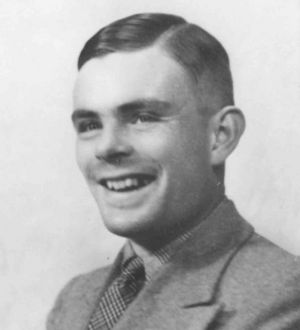Difference between revisions of "Alan Turing"
Dadsnagem2 (Talk | contribs) m |
(cat) |
||
| Line 20: | Line 20: | ||
{{DEFAULTSORT:Turing, Alan}} | {{DEFAULTSORT:Turing, Alan}} | ||
| + | [[Category:Homosexuals]] | ||
[[Category:Mathematicians]] | [[Category:Mathematicians]] | ||
Revision as of 23:18, April 21, 2008
Alan Turing (1912 - 1954) was a British mathematician considered to be the founder of modern computer science and cryptography.[1]
In the 1930s Turing proposed the concept of a "Universal Turing Machine". Turing had, first, proposed that the operations needed to calculate any formula could be broken down into a base set of instructions (or primitive recursive functions) that could in principle be followed by a machine: the "Turing Machine". Once fully formalized the calculations needed to derive the instructions themselves were capable of being run by a Turing Machine. The looped logic allowed the conception of a Turing Machine that could create its own instruction and, in principle, run a huge variety of calculations. Turing then used the concept of Universal Turing Machine to prove the undecidability of the halting problem.
During World War II Turing was assigned to the codebreaking unit at Bletchley Park, where he worked on the decoding of the German's Enigma machine. Turing and his colleagues played a significant role in the Allied victory in WW2, allowing Allied forces access to German communication networks throughout much of the war.
In his 1950 paper "Computing Machinery and Intelligence" (Mind 49: 433-460) Turing proposed a test (apparently heavily influenced by Logical Positivism) for establishing whether a computer could think.
Turing was arrested in 1952 for homosexual acts and subsequently lost his security clearance. He was allowed to stay out of prison by agreeing to be injected with female hormones (which would supposedly decrease his sex drive). He later confided to a friend that the hormones caused him to grow breasts.[2] This may have contributed to his suicide by cyanide poisoning in 1954.[3]
References
Online biography: http://www.turing.org.uk/bio/
Computing Machinery and Intelligence: http://cogprints.org/499/00/turing.html
Oddballs and Eccentrics. Shaw, Karl. Edison, New Jersey: Castle Books, 2004.
- ↑ Http://www.turing.org.uk/bio
- ↑ Oddballs and Eccentrics. Shaw, Karl. Edison, New Jersey: Castle Books, 2004
- ↑ http://www.turing.org.uk/turing/index.html
